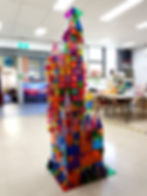Why Teach Engineering To Children?
- JC INGENIUM
- Feb 10, 2023
- 2 min read

In Australia today, most students don’t study engineering until they get to college—if ever.
But introducing children to engineering at a much younger age—as early as elementary school—makes good sense. First of all, children are naturally fascinated with building things, not to mention taking things apart to see how they work! Second, solving engineering design challenges involves highly effective learning strategies including project-based and hands-on learning. By learning the engineering design process, children build their problem solving skills which also transfer to other disciplines, including science, technology, art and math.

Learning engineering from a young age can help to build skills in other subjects, such as science and maths. Engineering can also help a child to understand real-world technologies and problems, thus allowing them to see how their other school subjects are related to their lives and the world around them.
Engineering activities help to remove any shame that comes from failure. Failure is an important part of the problem-solving process and is a way of learning. There are also no correct answers in engineering as problems can have many different solutions. Children are natural problem-solvers. Kids are naturally curious and have a love of trial and error. Most begin building and designing as soon as they can sit up! We can encourage and stimulate these natural tendencies by involving them in engineering activities early on.
Teaching children engineering from a young age can explain why team work is so important. The skills learnt through engineering are vital for a successful career, regardless of their chosen field. Exposing children to engineering means they become more aware of the fantastic range of opportunities available in the engineering, science and technical sectors.

It’s easy to catch a student’s attention with a cool project like building a tower; the real challenge comes with teaching them the engineering fundamentals in a way that keeps their interest. While older students may be able to wait for weeks to see results, younger children can lose interest quickly without quick, observable results. -For instance, our Magnetic Tiles Workshops bring the benefit of building easily to arouse enthusiasm so that they were willing to work on more complicated projects that took more time to complete.
In conclusion, it’s safe to say almost everything human-made was created by an engineer. Engineers and their skills are in high demand across many sectors from manufacturing to the finance industry. Engineering education is important in this day and age to engage youth with engineering concepts but to also help them develop the problem-solving skills that all engineers develop throughout their training. The ability to think through complex problems, collaborate with others, communicate human-needs, and persevere through failures are also important skills that are developed through Engineering Education.
